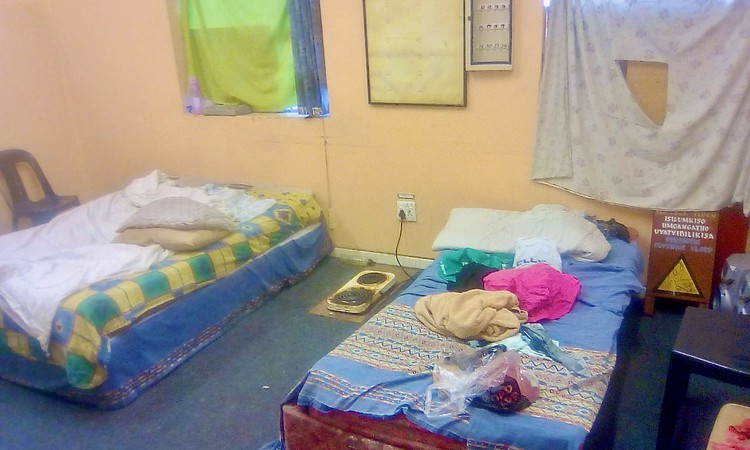Covid-19: “Gugulethu 7” backyarders say they’ve been abandoned
“We have received no food parcels, masks, gloves or even sanitisers”
Calling themselves the Gugulethu Seven or G7, after the anti-apartheid activists killed by police in 1986, more than 100 former backyarders are living in a community hall in Gugulethu. They say they have been neglected during the national lockdown.
The group has been living in Luyolo Community Centre since June 2018, after they were evicted from open land next to the hall, which they had occupied in February 2018.
An almost empty bottle of hand sanitiser sits on one of the makeshift tables. There are no face masks in sight. Small children run around. Adults clean the area or while away the time in conversation. People make trips to nearby spaza shops.
“The situation here is very bad,” resident Nomaphelo Qunta told GroundUp. “Most of us are coughing and we have no idea whether any of us has the coronavirus or not.”
Qunta said a week ago two mothers took their children aged six and two to Red Cross Children’s Hospital, because of a “very bad cough”.
“They came back with medication but the parents didn’t say anything about the children having the virus,” she said.
“Since the beginning of the lockdown, we have received no food parcels, masks, gloves or even sanitisers. This sanitiser that you see here was bought by me because I am the only one who is employed out of everyone in this hall,” said Qunta.
Qunta has always lived in Gugulethu. She said she registered for a house years ago on the City of Cape Town’s database, only to find out last year that her name was no longer on the list.
“I do not know how it happened and it was not explained to me how my name could have disappeared … I re-applied in August last year, but now does this mean I will go to the bottom of the list even though the disappearance of my name was not my fault?” she asked.
Western Cape Department of Human Settlements spokesperson Marcellino Martin said, “The commitment to relocate the people currently housed in the community hall, particularly the most vulnerable, which is the elderly and disabled, still stands.
“We are still in the process of getting the necessary approvals from the City to enable us to commence with the establishment of the transitional areas.”
Martin did not respond to GroundUp’s query about providing help to the backyarders during the lockdown period.
Support independent journalism
Donate using Payfast

Don't miss out on the latest news
We respect your privacy, and promise we won't spam you.
© 2020 GroundUp.
This article is licensed under a Creative Commons Attribution-NoDerivatives 4.0 International License.
You may republish this article, so long as you credit the authors and GroundUp, and do not change the text. Please include a link back to the original article.

